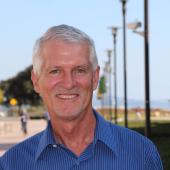
This year's John M. Prausnitz AIChE Institute Lecturer is James B. Rawlings, Professor, Mellichamp Process Control Chair, Department of Chemical Engineering, University of California, Santa Barbara.
This is the 77th AIChE Institute Lecture.
Process Engineering at the Dawn of AI
James B. Rawlings, Professor, Mellichamp Process Control Chair, Department of Chemical Engineering, University of California, Santa Barbara
Maintaining high standards of living while decreasing our impact on the planet requires both new manufacturing technologies as well as increasingly efficient operation of these technologies at large scale. Process systems engineering will play a critical role in addressing these challenges.
We start with a review of some of the advances that have taken place in the field of process systems engineering during the last 50 years. We focus specifically on process control because it is currently faced with several new challenges: increasingly stringent product quality requirements, tighter environmental regulations, and increasingly transient operating conditions, e.g., large fluctuations in electricity prices and supply chains. We present the central ideas of model predictive control, which has become during this period the leading advanced feedback control method, both in industrial practice as well as a topic of control theory research. We discuss the fundamental reasons for this success, which builds upon the foundations of optimal control and dynamic modeling, supplemented with measurement feedback to make the resulting system robust against model inaccuracies and disturbances.
At the dawn of AI, we anticipate using machine learning and deep neural networks trained on large datasets to provide improved modeling capability. But when we create models for process optimization or process control, the basic issue to be understood is how much information are we able to extract from available measurements, and how much domain-specific structural information must we provide, e.g., conservation laws and thermodynamic principles, before the optimization of such composite models is reliable and useful. We currently lack systematic guidelines for how best to combine these two sources of information.
Finally we discuss the education of chemical engineers to understand, operate and improve these new technologies. Adding to our educational challenge, universities are now seeing the first generation of engineering students who first ask ChatGPT to solve their homework exercises or write their software code. Meanwhile most of these exercises were designed to be solved solely by the students, to start building up their engineering understanding and intuition through simple examples. This mismatch in current educational materials and widely-available large language model technology is a pressing challenge that educators must now address.
About the John M. Prausnitz Award Lecture
The Executive Board of the Program Committee invites a distinguished member of AIChE to present a comprehensive authoritative review of the chemical engineering science in his or her field of specialization. Selection criteria include:
- the quality and relevance of the accomplishments of the lecturer in the technical field likely to be the subject of the lecture
- the communication skills of the lecturer
- the value of the lecture to the meeting attendees and the members of the Institute
To honor Dr. John M. Prausnitz of the University of California, Berkeley's exceptional impact on the profession, society, and generations of chemical engineering students, AIChE’s Board of Directors has agreed to rename the Institute Lecture to the John M. Prausnitz AIChE Institute Lecture. The AIChE Foundation gratefully acknowledges the generosity of John’s closest peers who have made lead gifts to establish an endowment to support the Lecture and ensure John’s name will be recognized in perpetuity.
Supported by the AIChE Foundation

